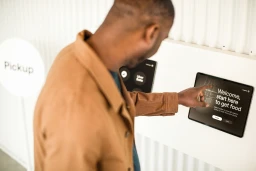Kitchen Management Software: Why Consider?
Table of Contents
CloudKitchens
How many tacos can be delivered from a 1000sqft restaurant?
The same amount as a 200sqft ghost kitchen.

From pop-up kitchens experimenting with the latest cuisine trends, entrepreneurs exploring how to start a food truck, to new restaurants that are taking advantage of increased consumer demand for food delivery, there’s one thing that all successful ghost kitchens have in common: a state-of-the-art kitchen management system.
When it comes to tracking sales and inventory and connecting all of that data, kitchen management systems are a restaurant’s best bet. A digital kitchen manager system offers unparalleled opportunities for streamlined kitchen operations, boosted profitability, and business growth.
Still not convinced? Here are seven top reasons kitchen management systems are worth your consideration.
What Is Restaurant Kitchen Management Software?
Kitchen management software refers to systems designed to integrate, organize, and optimize the various daily processes within a restaurant’s kitchen. These programs offer tools to handle tasks like order management, inventory, scheduling, cost accounting, and menu creation.
Essentially, kitchen management systems should streamline and automate many of these processes, saving your team time and cutting down on human error.
Plus, by integrating information related to inventory, orders, schedules, and costs, these tools make it easier to organize and understand your kitchen’s current operational status.
Read More: Boost Your Delivery Business With Commissary Kitchens
What Are the Key Features of Kitchen Management Software?
Good kitchen management systems offer various tools that can be used every day in your restaurant. So, let’s dive into some of these essential features!
1. Order Management
One of the core features of kitchen management software is its ability to record and organize order information. This means every order placed gets logged in the system with all the important details: costs, frequency, and sales data.
With this information, you can easily see which dishes are most popular, if there are specific times or days when certain orders spike, and what the associated costs are. These insights are crucial for strategic decisions like restocking inventory, setting prices, and planning promotions or other campaigns.
2. Inventory Management
The best kitchen management systems offer tools that sync order fulfillment directly with inventory counts, automatically updating remaining quantities.
This feature not only reduces the chance of human error-whether from miscounts or forgotten records of what was used-but also saves valuable time by automating the entire process and eliminating manual counting.
Typically, these inventory management tools are linked to your order history, automatically deducting ingredients based on how much food you sell daily.
Read More: Food Quality Control: What it is and how to apply in delivery
3. Streamlining Order Flow
Manually organizing and prioritizing orders, especially when they come from various channels, can be both laborious and inefficient. Think about it: social media, food delivery apps, phone calls, and often in-person orders too!
A good kitchen management system should unify all these orders in a single location and then sort them by priority. After all, when it comes to delivery, some orders naturally take longer due to travel time, and this needs to be factored into the priority setting.
4. Menu Analysis
Menu management tools provide valuable data on your most popular orders over time, as well as their impact on inventory. This not only makes restocking easier but also helps you understand which dishes are thriving and which might need to be rethought or replaced.
What’s more, when you add a new dish, this feature lets you input the ingredients. It then simulates the impact on your inventory and even suggests optimal adjustments to ensure you have all the necessary resources for your new menu item.
5. Performance Reports
Finally, restaurant management software often includes tools that generate overall performance reports for your establishment.
This means you get insights into your profit margins, cost of goods sold, customer ratings, employee productivity monitoring, and much more. With this information, managers can gain valuable insights, pinpoint areas for improvement, and make necessary adjustments to optimize their operations.
Read More: All About California Food Licenses and Permits
Why Use Kitchen Management Software?
Kitchen management software offers tools that significantly boost your restaurant’s productivity and profitability. These systems help you organize and optimize your processes, streamlining operations no matter your restaurant’s specific needs.
Ready to see how it can be a game-changer?
1. They can connect you to the cloud
These days, all different types of restaurants need kitchen management systems that allow them to tap into the power of the cloud. Cloud computing software represents the wave of the future as more and more businesses turn to cloud solutions to cut down on IT costs while ensuring their information is secure.1 Restaurants are no exception.
Ghost kitchen management software is one of the best solutions for running more efficient and profitable kitchens. The best of the best offers a range of valuable benefits for a restaurant owner, from speedy system updates that don’t interrupt the flow of business to features that allow you to stay in the loop even when you aren’t in the kitchen.
What’s more, uploading your kitchen to the cloud can also provide your restaurant with opportunities for:
- Easy scaling: Ghost kitchen management software can be your best sous chef when it comes to growing your business. Cloud systems make it easy to integrate new locations into your existing framework. They can also help grow your business by connecting you with new customers via third-party ordering apps like Grubhub that send orders to your system.2
- Multiple locations management: When your restaurant operates out of multiple ghost kitchens, it’s extremely important that each location has access to the same up-to-date data. Cloud systems offer automatic real-time updating so that everyone from your head chef to your accountant is working from the same recipe.
- Enhanced data visibility: Want to know how popular a specific menu selection was last Thursday between 4 pm and 9 pm? Need to find out your average lunchtime sales for the last quarter? Cloud systems bring all of your restaurant’s most vital data to your fingertips, generating reports and delivering real-time insights in seconds.
2. They integrate seamlessly with other systems
As a busy ghost kitchen that serves hungry customers all over town, it’s highly unlikely that a single system will meet all the demands of your restaurant. This is especially true for delivery-only restaurants that rely on a range of restaurant technology, devices, and third-party apps to do business. Delivery restaurants have a lot of moving parts, so learning tips for proper food delivery packaging and simplifying your business processes can be extremely beneficial.
Fortunately, the best kitchen management software integrates seamlessly with your current systems by connecting the various devices and restaurant technology you and your employees use every day. From the food preparation line to payroll, kitchen management systems can integrate with your:
- POS systems
- Kitchen display systems
- Online food ordering systems
- Food Delivery Apps
- Customer loyalty apps and programs
- Accounting, and human resources systems
3. They can digitize your recipes
Successful restaurants are built on meals that deliver consistent quality. That begins with tested recipes and ends with dishes that are executed flawlessly every time.
But that’s only part of why recipes are such a crucial part of kitchen management and kitchen operations as a whole. Your recipes also cue you into some of the most important aspects of your business, from tallying inventory and ordering ingredients to figuring out what you will profit from each meal you serve. Menu engineering should be a top priority for making the best margins on the food items you choose to serve your customers, while also understanding what items work best for delivery service.
Digitizing your recipes can help ensure:
- Product consistency: When your kitchen management system is the home of all of your restaurant’s recipes, you can be sure that each employee has easy access to the information they need. Plus, when it’s time to make recipe changes or substitutions, real-time updating means that everyone gets the correct information.
- Enhanced inventory control: Kitchen management systems can give you valuable insight into your inventory measures. This helps you anticipate your ordering needs, estimate food costs, and avoid missing out on sales because you’ve run out of supplies.
- Recipe scaling: Some systems have features that help you scale recipes. This can be extremely useful in special situations, for instance, if your kitchen receives an unexpectedly large or group food order and you need to up your portions on the fly.
4. They offer automation features
The best kitchen management systems offer options for automation. Automating various aspects of your operating responsibilities—from inventory management to accounting—can save you time, improve your productivity, and even cut back on expenses.
In short, automated kitchen management systems can streamline and optimize every aspect of kitchen management, including:
- Your finances: If you’ve ever spent endless hours analyzing spreadsheets or struggling to understand complicated tax requirements, you can appreciate the value of a system that does all of that for you. Bookkeeping, expense reports, and even tax information can populate in minutes whenever you want.
- Your forecasting: With an automated system, things like menu costs, ingredient prices, and profit margins can be quickly, easily, and accurately estimated based on anticipated business volume. This can cut down on wasted ingredients and lost time. It can also increase preparedness and save money.
- Your efficiency: Automated systems can greatly improve your productivity. These systems can send automatic alerts about potential problems or concerns, like low inventory levels or recipes that are losing you money. That way, you can address them before they become big problems.
5. They’re user-friendly
With so much technology packed into one system, kitchen management software is probably difficult to learn and a hassle to use, right?
Wrong. A key feature of any quality kitchen management system is an easy and enjoyable user experience.3 That way, every single member of your kitchen staff is able to understand and use it. This saves you time on lengthy training and tutorials and won’t frustrate your kitchen staff.
Look for restaurant kitchen management software that offers:
- Intuitive use: Quality kitchen management systems rely on best practices and restaurant industry standards when designing their interfaces. As such, their interfaces are familiar and sensical.
- Quick learning: You most likely have a busy kitchen, which means you need a system that you and each employee can get the hang of quickly. The best systems offer built-in comprehensive training.
- Everyday value: Few things will frustrate employees as much as having to adapt to changes that don’t benefit them. A top-notch kitchen management system offers your employees tools that help them do their jobs and improve their daily work experience.
6. They offer strong support networks
Technology isn’t perfect. Even the strongest systems are susceptible to bugs, crashes, and other issues that can get in the way of business.
Fortunately, when you invest in a kitchen management software solution, you get access to a dedicated and knowledgeable team of technicians who are standing by to help you in case anything goes wrong.
Many system vendors offer customer support. But the best ones know that restaurants are busiest when most other businesses—including support call centers—are wrapping up for the day or week. That’s why they need to offer around-the-clock support every day of the week. Look for a service that gives you several ways to contact them, such as
- Phone assistance
- Online chat assistance
- Text message assistance
7. They’re customizable
Not all ghost kitchens are the same. A ghost kitchen in Austin could differ from a ghost kitchen in Philadelphia because they serve different cuisines to different customers on scales that can vary greatly. They serve different cuisines to different customers on scales that can vary greatly. Each has unique business goals and faces unique challenges. How could any management system possibly benefit them all?
That’s where customization comes in. Kitchen management systems are versatile solutions that adapt to suit a range of business models. From commissary and commercial kitchens to incubator kitchens and kitchen pods, kitchen management is easier with a software service.
The kitchen management system that’s right for you is the one that allows you to tailor it to meet the specific needs of your restaurant. Modular systems let you pick and choose the features you want, which can:
- Save you money: When you’re able to self-select only the services that will actually benefit your restaurant, you aren’t wasting money on ones that don’t. This makes your software investment even more worthwhile and may even translate to long-term savings.
- Gives you control: Handing over all of your most valuable business data to a third party can be scary. Modular systems allow you to decide which aspects of your business a third party can access.
Start cooking with CloudKitchens
Restaurant kitchen management software can help you manage many of the day-to-day tasks of your ghost kitchen. The right solution can make data safe and accessible, streamline your inventory and ordering process, and help you coordinate between multiple locations—all through intuitive software.
CloudKitchens provides all of the above and more.
We make it easy for restaurateurs to reach new audiences or launch a new ghost kitchen. Our restaurant management technology puts all the aspects of running your kitchen in a single place. From one tablet, you can access all of your orders, delivery platforms, and valuable business insights.
Ready to turn up the heat in your kitchen? Take a tour today.
Explore ghost kitchen locations across the US:
- Ghost kitchens in San Francisco
- Ghost kitchens in LA
- Ghost kitchens in NYC
- Ghost Kitchens in Toronto
- Ghost Kitchens in Atlanta
- Ghost Kitchens in Dallas
- Ghost Kitchens in Chicago
- Ghost Kitchens in Denver
- Ghost Kitchens in Miami
| DISCLAIMER: This information is provided for general informational purposes only and the content does not constitute an endorsement. CloudKitchens does not warrant the accuracy or completeness of any information, text, images/graphics, links, or other content contained within the blog content. We recommend that you consult with financial, legal, and business professionals for advice specific to your situation. |
Sources:
Business Insider. Why Companies Are Flocking to the Cloud More Than Ever. https://www.businessinsider.com/cloud-technology-trend-software-enterprise-2021-2
Oracle. Five Benefits of Cloud-Based Restaurant POS Systems. https://blogs.oracle.com/foodandbeverage/post/five-benefits-of-cloud-based-restaurant-pos-systems
Oracle. 8 Essential Restaurant Management System Features to Look Out For. https://blogs.oracle.com/foodandbeverage/post/restaurant-management-system-features
More insights & stories
There’s more where that came from.
Get in the know and check out our additional insights




